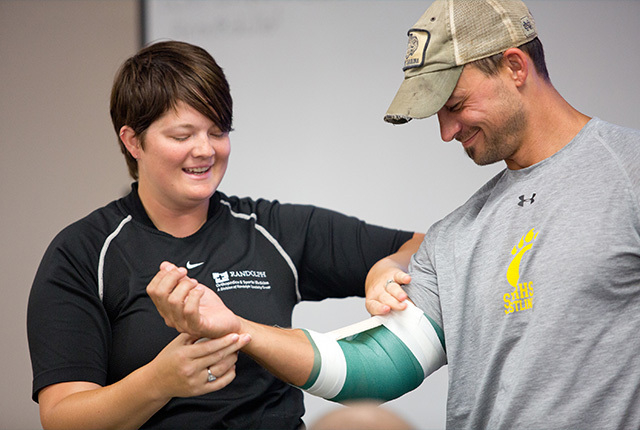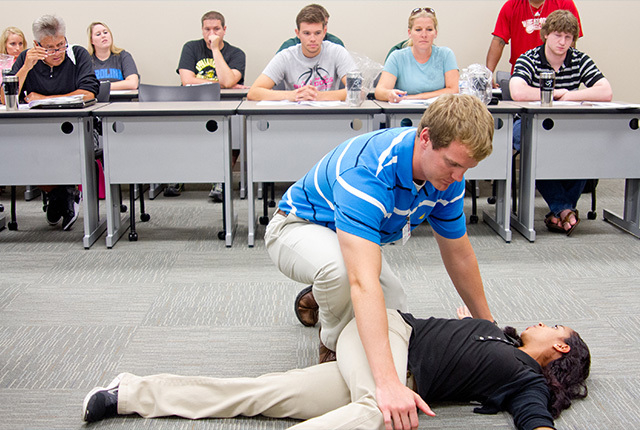
Power, speed, intelligence, skill — these are just a few of the words many people use to describe star athletes, but in order to hit that home run, make that big tackle or even pull off that complex stunt, athletes need healthy bodies and that’s where Randolph Athletic Training Services enters the picture.
When a player goes down hard and stays down, most sports fans know it means an injury. That man or woman quickly breaking toward the athlete certainly knows it, and if that athlete should happen to be from one of the six covered high schools in Randolph County, that person is a certified athlete trainer with Randolph Athletic Training Services.
The certified athletic trainers are at all home and away football games and all football and basketball practices.
“By law, an athletic trainer or first responder has to be at all football practices and games so that takes precedence,” Karissa Lea, certified athletic trainer says. “For sports without a law requiring coverage, we go to the sport with the highest risk. The top four are football, lacrosse, wrestling and basketball. Other sports are covered, such as soccer and volleyball. We may not be at their practices all the time, but they know they can find us at another practice and if they need us, we’ll come help.”
Having a certified athletic trainer at practice means having another set of eyes on the field or court and brings another level of readiness to the event. Some of the considerations for injury prevention and emergency preparation extend beyond having a full first aid kit.
“We do setup for water and injury ice. We scan the field to make sure we don’t see anything that could be potentially dangerous. We also have to make sure we have communication with EMS, know who to contact and verify the appropriate gates are unlocked in case we have an emergency.”
Some of the more common injuries Lea says the certified athletic trainers see are concussions, knee injuries, such as ACL sprains and, over the course of a season, she estimates about two or three fractures from wrestling and football.
Sure, those certified athletic trainers handle the bumps and bruises and cuts and scrapes and handle them well, but their responsibilities are far more than simply doling out bandages and they require a lot of very specific education. A lot of Randolph Athletics Training Services’ mission is prevention.
“It’s better, on the front end, to try and prevent an injury than it is to try and recover from an injury,” Joe Mullins, manager of Randolph Athletic Training Services says. “We have detailed, sport-specific programming in place to assist those athletes in decreasing the likelihood of injury, whether they play basketball, baseball, football, soccer volleyball — all your local sports.”
Lea says all the certified athletic trainers with Randolph Athletic Training Services are focused on fixing the cause of the injury more than the quick fix. She also says the type of injury and where in the week the injury occurs can factor into the treatment. A Thursday injury which does not prevent an athlete from playing may first receive treatment to safely get a player on the field for a Friday game, but an injury which occurs early in the week would likely begin with a focus on rehabilitation.
“For injuries that occur on Monday and Tuesday,” Lea says, “I really try to get the coaches on board with, ‘Hey. Let them rest. Let me rehab them.’ ”

When it comes to concussions, each student athlete participating in a contact sport, including cheerleading, is baseline tested prior to the season in case that athlete suffers a possible concussion during the season. Physicians are requesting baseline testing, Lea says, because they want to see a pre- and post-injury test to make sure the athletes can safely return to play.
Another concussion-relation venture Randolph Athletics Training Services is undertaking is a return-to-learn protocol, in addition to the return-to-play protocol. The return-to-learn protocol helps school nurses, teachers and other administrators navigate concussed student athletes’ return to the classroom.
“A lot of times we think of concussions in sporting activities, but these student athletes actually have to return to the classroom as well, so this is more of a gradual return,” Mullins says. “We’ve implemented it this fall.”
Mullins says he’s excited about the direction of Randolph Athletic Training Services and adds it hopes to expand and include additional schools in the future.
For more information on Randolph Athletic Training Services or their injury-prevention programs, call (336) 302-3249.
– See more at: http://courier-tribune.com/thrive-magazine/health-and-beauty/randolph-athletic-training-services-keep-student-athletes-action#sthash.PAA5Ongy.HeVUuOJo.dpuf
ORIGINAL ARTICLE:
http://courier-tribune.com/thrive-magazine/health-and-beauty/randolph-athletic-training-services-keep-student-athletes-action